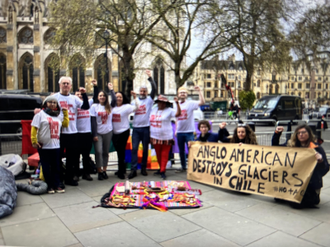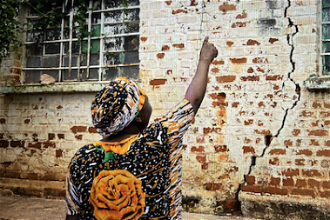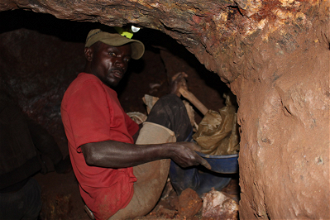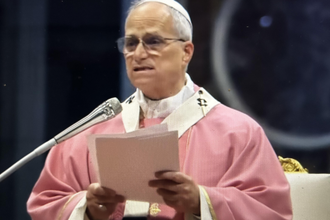London: Campaigners confront Anglo-American AGM

LMN campaigners outside QEII Centre
Source: London Mining Network
Activists from London Mining Network and War on Want were joined yesterday by land defenders from mining affected communities across Latin America outside the Annual General Meeting of Anglo American to protest the company's damaging practices. Outside the QEII Centre in Westminster, the demonstrators gathered with banners and enacted a short ritual in thanks of nature, reflecting the practices of many people displaced by Anglo American's extractive operations in Latin America. The land defenders, Victoria Uranga, Carlos Mitraud and Lourdes Huanca attended the AGM to pose questions and concerns from their communities directly to the company's board of directors.
Anglo American is one of the largest mining companies in the world, with 56 operations across 15 regions and a revenue of over $35 billion. Anglo American mines threaten water safety and security, create pollution and drive socio-environmental conflicts in the territories where they operate. Local communities and indigenous peoples, along with ecosystems, face the highest costs of intensive extraction.
Victoria Uranga is a community member of the Lo Barnechea, affected by Anglo American's Los Bronces project in Chile. She is an environmental leader and educator, defender of nature. Director of the Mapocho Basin Defense Corporation and the Churque Ecological Center and member of the Territorial Coordination in Defense of Glaciers and the No + Anglo Chilean Movement.
In Chile, Anglo American has two operations: El Soldado and Los Bronces. The Los Bronces Integrado expansion project has been denounced by various organisations and communities in the country. This project involves the expansion of the mining corridor between the mountain range and the Valparaíso region, including an underground mine under the Yerba Loca Nature Sanctuary. In 2010, it was already clear that the Los Bronces operation directly impacted the glaciers. According to the authorities of the Environmental Impact Assessment System, this project is harmful because of its intensive and irresponsible use of water and considered a potential risk to ecosystems and people's health. The National Institute of Human Rights considers this project to be one of the country's socio-environmental conflicts, as mining operations cause direct damage to glaciers and would also be responsible for creating large amounts of toxic waste.
Carlos Mitraud is a community member of Córregos, a district in the municipality of Conceição do Mato Dentro, where Anglo American operates the Minas Rio project. Carlos is a community leader of the movement to claim against the damages caused by Anglo American. He is a representative of the Local Commission for Affected People in Córregos. For some years now, Carlos has been raising the demands of the 13 communities affected by Anglo American in Brazil.
In Brazil, residents of the state of Minas Gerais, where Anglo American operates Minas Río, fear for their safety. The Sapo dam exceeded the limits established by law. The State Attorney General's Office filed a public civil action against Anglo American for this situation because the construction of dams is prohibited when there are communities inhabiting the rescue areas. Downstream of the dam reside the communities of São José do Jassém, Água Quente and Passa Sete. In addition, the consequences of the Minas Río operations are felt at great distances. The project includes an oil pipeline of about 530 kilometres. This pipeline is used to transport large volumes of iron ore, and requires large amounts of water. Local communities condemn the worsening water crisis, as this situation has also caused the contamination of rivers and the destruction of springs.
Lourdes Huanca is president of the National Federation women FENMUCARINAP (National Federation of Peasant, Artisan, Indigenous, Native and Wage-earning Women of Peru) has been visiting Europe to draw attention to the urgent human rights situation in her home country. She addressed the UN Human Rights Council in Geneva on 23 March.
In Peru, Anglo American's Quellaveco copper mine has been linked to polluting metals found in the Asana river basin and other rivers on which the population depends on for water consumption. An environmental assessment in the area of Quellaveco Mining Project carried out in 2017 and 2018 found that the concentrations of sediments in all the streams and rivers in the area exceeded the values of the Internal Sediment Quality Guide (ISQG) and/or the Canadian Standard Probable Effect Level (PEL) for arsenic, cadmium, copper, chromium, mercury, lead, and zinc. Laboratory studies (2019 - 2021) confirm the presence of heavy metals in the blood of local children.
LINKS
For more on Anglo American's impact in Latin America, you can review the latest LMN report: 'Should do better: Anglo American's mining operations and affected communities in Latin America' - https://londonminingnetwork.org/project/should-do-better/
Victoria Uranga, Carlos Mitraud and Lourdes Huanca will be speaking on their experiences of opposing Anglo American at a public event on 28 April - Responses to Mining from Brazil, Chile and Peru. See: www.eventbrite.co.uk/e/responses-to-mining-from-brazil-chile-peru-tickets-620864391107


















